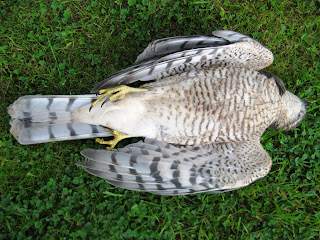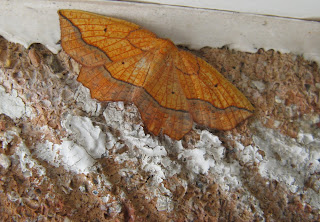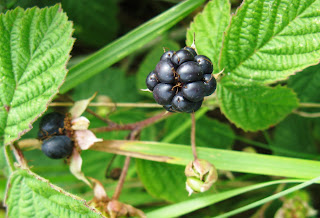This blog may help people explore some of the 'hidden' issues involved in certain media treatments of environmental and scientific issues. Using personal digital images, it's also intended to emphasise seasonal (and other) changes in natural history of the Swansea (South Wales) area. The material should help participants in field-based modules and people generally interested in the natural world. The views are wholly those of the author.
Thursday, 29 July 2010
Bite Size?
Being 2 metres in height, I became initially somewhat paranoid when reading that midges particularly go for tall men and overweight women when seeking a blood meal (http://www.guardian.co.uk/environment/2010/jul/28/midges-tall-men-overweight-women). There is actually nothing magic about this as they reach tall men first when they dive bomb from the sky! Overweight persons (not perhaps restricted to women) tend to produce more of the cues (e.g. carbon dioxide and lactic acid) the insects favour.
Wednesday, 28 July 2010
Seeing the Changes 317
In Loughor, Sweet chestnut (Castanea sativa) was coming into fruit. Spotted a Tabanus sudeticus in Bynea.
Birder's Bonus 72
Not much of a bonus this time. Discovered a dead Sparrowhawk (Accipiter nisus) in my garden in Loughor. It had presumably hit the patio window at speed whilst hunting the family of Blackbirds that frequent the location. Sad to see such a beastie cut down.
Monday, 26 July 2010
Seeing the Changes 316
In Loughor, my bird feeder was visited by an acrobatic Norway rat (Rattus norvegicus). At the National Botanical Gardens Wales, White water-lily (Nymphaea alba) was joined by Flowering rush (Butomus umbellatus) and Monkey flower (Mimulus guttatus). A Grass eggar moth (Lasiocampa trifolii) was also spotted. It was a day for swarming Black garden ants (Lasius niger) and Honey bees (Apis mellifera).
Sunday, 25 July 2010
Seeing the Changes 315
Visited in the humid Loughor weather by a Bordered beauty moth (Epione repandaria). In Bynea, the Common centaury (Centaurium erythraea) was in flower and there was lots of hoverfly activity from Scaeva pyrasti.
Thursday, 22 July 2010
Wednesday, 21 July 2010
Drowning- His Sorrow
There is a news item about a Staffordshire man fined £1547 for drowning a Grey squirrel that had dared to steal the food he put out for birds (http://www.dailymail.co.uk/debate/article-1296366/Why-I-hate-squirrels.html). The alien Grey is, of course, an animal introduced from North America and is blamed for the decline of the native Red squirrel. They are also said to be much more damaging to UK forests than the 'natural' version of the rodent. It is legal to kill Grey squirrels (some people advocate eating them) but the individual convicted was taken to court by the RSPCA and obtained the ruling that drowning was 'cruel' (in comparison with poisoning, shooting or breaking the neck). This appears to be a 'grey area'.
Sunday, 18 July 2010
Seeing the Changes 313
In Loughor, Salsify (Tragopogon porrifolius) was in flower and there was what appeared to be a congress of small bees on a grass head. The poisonous berries of Bittersweet (Solanum dulcamara) were turning red in Penclacwydd.
Saturday, 17 July 2010
Birder's Bonus 71
Goldfinch (Carduelis carduelis) are feasting on the seed-filled heads of Spear and Creeping thistle.
Friday, 16 July 2010
Seeing the Changes 312
In Loughor, Bramble (Rubus fruticosus) and Mountain ash (Sorbus aucuparia) berries were ripe. Field mushroom (Agaricus campestris) were also emerging. Gatekeeper (Pyronia tithonus) butterflies flitted about. There were lots of Gastrophysa viridula beetles on Hogweed. Common green capsid (Lygocoris pabulinus), Forest bug (Pentatoma rufipes) and Miris striatus were spotted on vegetation. In Gorseinon, there were leeches in my daughter's garden (in spite of there being no pond or stream). In Bynea, lots of Common fleabane (Pulicaria dysenterica) is in bloom. The Bristly ox-tongue (Picris echioides) has been in flower on the Swansea campus for about a week.
Wednesday, 14 July 2010
Badger Bounces Back!
The news (http://www.bbc.co.uk/news/10612240) that the Court of Appeal have unanimously (3 to 0) rejected the Welsh badger cull intended to reduce the spread of bovine TB in cattle herds is interesting. The judges found that the science did not support the view that the elimination of circa 1500 badgers in Pembrokeshire would reduce the incidence of TB in herds. The farmers, however, still seem convinced (http://www.bbc.co.uk/news/10626933) that the exercise would benefit them as "all the political parties in Wales, supported the cull". Could they have been after rural votes? This one will run and run.
Monday, 12 July 2010
Birder's Bonus 70
After a long hiatus, following the creation of the all-weather running track, a small number of House martins (Delichon urbica) returned to the eaves under the roof of the Swansea University Pavilion changing rooms. They may have only been inspecting the site as there was no building activity (the supply of mud appears to be the problem).
Sunday, 11 July 2010
Seeing the Changes 311
In Loughor, the Orange hawkweed (Hieracium auranticum) had oranged into life (a football prediction-perhaps not?). The seasons are advancing quickly with the Dog rose (Rosa canina) becoming hip, the Sycamore (Acer pseudoplatanus) preparing to fly and the Ash (Fraxinus excelsior) all keyed up. In Bynea, Teasel (Dipsacus fullonum), Common toadflax (Linaria vulgaris) and Marsh mallow (Althaea officinalis) were in flower. Hawthorn (Crataegus monogyna) was in hip and Sea buckthorn (Hippophae rhamnoides) in berry. In Penclacwydd, a female Green-veined white (Artogeia napi) and a Small copper (Lycaena phlaeas) were in flight. Lots of Bumble bee activity with red-tailed Bombus lapidarius visiting the thistles and others lurking amongst leaves.
Saturday, 10 July 2010
Octo-Prophecy?
Reports that 'Paul the octopus' has been challenged in his 'predictions' of success for teams in the Soccer World Cup by a parakeet need examining (http://news.oneindia.in/2010/07/10/finals-psychic-paul-octopus-vs-mani-parrot.html). The 'infallable' octopus made his 'predictions' by choosing to seek a mussel in a box labelled with the flag of the winning team. One assumes the test (similar to tossing a coin) was done fairly (you could bias it by making the bait differ in size or attractiveness) but even so the success of the 'predictions' is certainly based on odds far better than those applying to people in lotteries. Paul predicts Spain in the final and Mani the parrot the Netherlands. One of them is bound to be right. A cunning way to get a bit of media attention?
Friday, 9 July 2010
Seeing the Changes 310
After rain and sun, a little brown toadstool came out in Loughor! In Swansea, Rhagonycha fulva beetles were mating and had been joined by a single Cteniopus sulphureus. Stone bramble (Rubus saxatilis) fruit was ripe. A Shaggy soldier (Galinsoga quadriradiata) waited by the door.
Subscribe to:
Comments (Atom)
-
I n the UK and US, a pparently popular and successful vegan/vegetarian restaurants are reportedly closing or adding meat to their menus ( ...
-
Early ripening fruit may seem convenient but some folk think it confirms environmental stress. There's also a possibility th...
















+reaching+Ynys+Hir.jpg)















+with+flies+Salies+de+Bearn+France.jpg)






++berries+hanging+Loughor.jpg)














%20mating%20NWCW.jpg)

